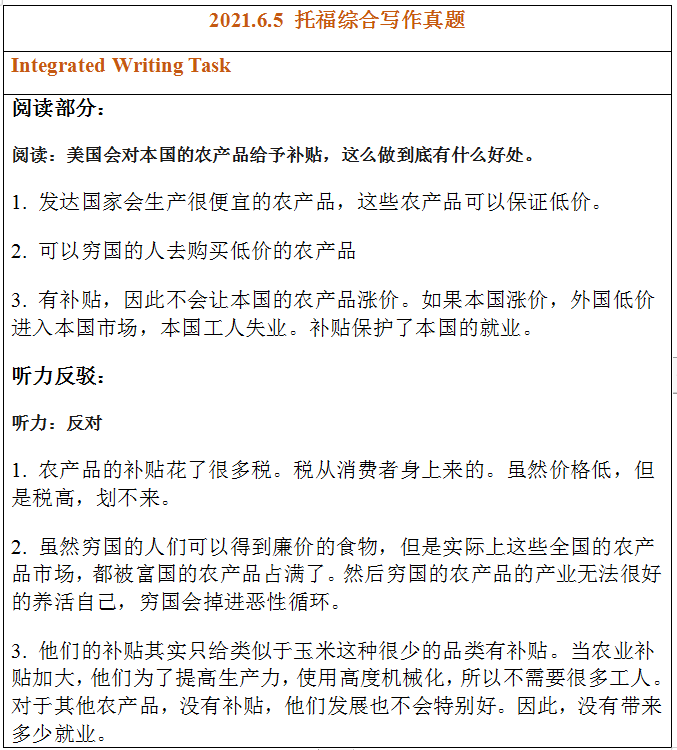

本期的综合写作是针对subsidy这个点做利弊分析,阅读认为好,听力一一反驳。这种利弊分析题型在TPO中还是非常常见的,以及关于政府给补贴这个话题TPO中也有类似的主题,具体可以参考下面的TPO练习。
可以类比下列的TPO综合写作练习:
TPO42 谈到tax subsidy
ethanol fuel
Reading: ethanol is not a good replacement for gasoline
1. not help to solve the biggest environmental problems
2. dramatically reduce the amount of plants available for uses
3. because of tax subsidy, never able to compete with gasoline on price
Listening: can be alternative resource
1. the process of growing plants counteracts the release of carbon dioxide
2. produce ethanol using cellulose that is not eaten by animals
3. price will go down once more and more people start buying ethanol
TPO 20 利弊分析
LET IT BURN
Reading: three kinds of damage are caused by the let it burn policy
1. tremendous damage to vegetation
2. large animals were seen fleeing the fire
3. tourists are not willing to come the the park.
Listening: not just destructive but also creative
1. 1 open and shaded place for smaller plants to grow 2 high levels of heat help plants germinate
2. rabbits and hares started thriving
3. in 1988, it is just very unusual combination to cause massive fire. After that, tourists come back again.

题目解析:
此题经典老题,再次证实ETS会把历年题目拿出来考,对于考生来说,梳理过去几年的题目就显得非常有必要了。本文支持要靠自己的知识和经验来解决问题。一是可以培养个人的独立解决问题的能力,也就是独立性。段内对比说即使依靠比人的建议,个人情况不同,听了别人的建议以后还是要自己对自身情况进行判断。在这个过程中,独立解决问题就尤为重要了。二是说自己解决问题也是一个自我审视的过程,同样用的是说理论证。想必大家在自己解决问题中都会有一些共同的经历,比如发现自己的不足,查漏补缺等等,这里当然也可以用个人经历作举例论证。
请参考如下范文:
Confronted by kinds of problems and even troubles in any sphere of life, people either use their own knowledge and experience or resort to others for help. Hence, there comes to the problem which way is much better. From my personal experience, I vote for using our own wisdom to tackle problems.
First of all, solving problems by ourselves is a good opportunity to train our ability to solve problems independently -- namely, train oneself to be independent. When we encounter problems in our daily life, it is impossible for us to find someone who are capable of giving feasible advice for all the issues or someone who are available to give suggestions at any time. Under this circumstance, it is imperative for us to form the habit of not relying on others. Furthermore, bear in mind that the situation differs from one to another. Others’ suggestions do not always suit. Granted that others are willing to give us some instructions, we still need to synthesize others’ experience with our own situation, in which case one’s own independent thinking is still the most important. During this process, kinds of capabilities are trained and strengthened, including one’s professional skill, communication skill, and sociable skill, not to mention the sense of confidence and achievement after completing a task successfully.
In addition, trying to solve problems with our own intelligence helps us conduct self-assessment. Honestly speaking, it is hard for someone to evaluate oneself objectively and comprehensively, but it is necessary to do some assessments at times. The reason is that self-evaluation helps us figure out our current weaknesses and find the right way in the future in order to prevent going astray on the way to our ultimate study and career. Considering this, not relying on others to solve problems affords a precious opportunity. During the course of seeking answers, one is granted the chance to use what has been learned and to judge whether one’s command of knowledge is solid enough to handle difficulties in life. How can someone be successful without clear and frequent self-evaluation? There lies a saying that it is we ourselves who understand us the most. By solving problems by ourselves, we can receive objective feedback of our own personal ability and quality. Apparently, if we ask others for help, this process is always omitted.
In a nutshell, fighting for answers by ourselves fosters one’s independence and evaluates one’s capabilities objectively. After all, no one has the obligation to give us suggestions all the time. By using own knowledge to solve problems, we become more mature and more capable.